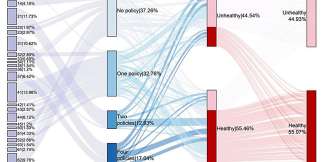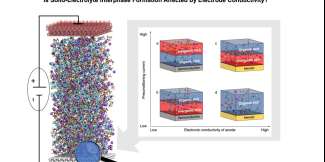Science X Dialog
Science X Dialog is where researchers can share news and information about their own published journal articles.
How to apply

Dialog / The development of 5G significantly increased the health of older adults, study finds
The Chinese government attaches great importance to the construction of Fifth Generation Mobile Communication Technology infrastructure (5G), which has been shown in a new study to play a positive role in the self-rated health ...

Dialog / Unveiling ancient climate secrets: South Atlantic's role in carbon exchange
In the annals of Earth's history, I've stumbled upon a gripping narrative of climate fluctuations and the captivating exchange of carbon. Recent research, which made headlines in the scientific journal Global and Planetary ...

Dialog / Digging water channels in mineral stishovite
Stishovite has the same chemical formula as silica quartz (SiO2) but it has much higher density. While SiO2 is abundant on Earth's crust, it is also a major component of basalt, a type of igneous rock that is rich in iron ...

Dialog / Unraveling a paradox of Himalayan glacier melt
One in five glaciers on Earth are covered with a layer of rocky debris. The presence of debris influences how glaciers melt. In the Himalaya, debris covers most large glaciers, and it is so thick that it should insulate the ...

Dialog / AI algorithm learns microscopic details of nematicity in moiré systems
Identifying and understanding experimental signatures of phases of matter is usually a challenging task due to strong electron interactions in a material and can become even harder due to external influences in samples with ...

Dialog / Nanocomposite-based electrocatalyst for alkaline overall water splitting at low cell voltage for hydrogen production
The diminishing conventional energy resources based on fossil fuels and their related environmental consequences have drawn attention around the world toward the development of renewable energy resources. These renewable ...

Dialog / X-photon 3D nanolithography
Multiphoton lithography (MPL) is a technique that uses ultra-short laser pulses to create complex three-dimensional (3D) structures at the micro- and nanoscale. It is based on the principle of multiphoton absorption (MPA), ...

Dialog / Quantum-enhanced detection for chip-scale wireless communications
The demand for fast data sharing and processing has sparked a race for greater bandwidth in wireless communication systems. This is described by Edholm's Law, which states that bandwidth and data rates roughly double every ...

Dialog / Mineralogy meets zero-shot computer vision
Identifying minerals is a complex and time-consuming problem for geologists, often taking anywhere from 30 minutes to several days per sample. Further complicating the situation is the fact that a sufficient portion of minerals ...

Dialog / The relationship between anxiety disorders and the extensive use of mobile phones
Nomophobia, or "NO MObile PHone PhoBIA" is when a person experiences fear or anxiety about not having mobile phone connectivity. Nomophobia is considered a modern phobia. It most likely stems from increased reliance on technology ...

Dialog / Researchers develop a sustainable gel film to capture carbon dioxide with reduced energy cost
Global CO2 emissions for 2022 reached 36.1 gigatons, and this consumed 13–36% of the remaining carbon budget to limit warming to 1.5°C, which means our permissible emissions could be depleted within two years.

Dialog / How the material of the battery electrode affects its performance and lifespan
Batteries are devices that store and release energy by moving charged particles called ions between two materials called electrodes. The electrodes are separated by a liquid or gel called an electrolyte, which contains ions ...